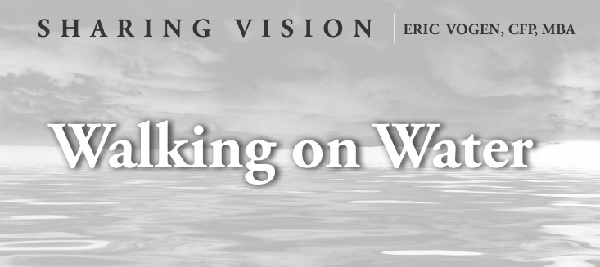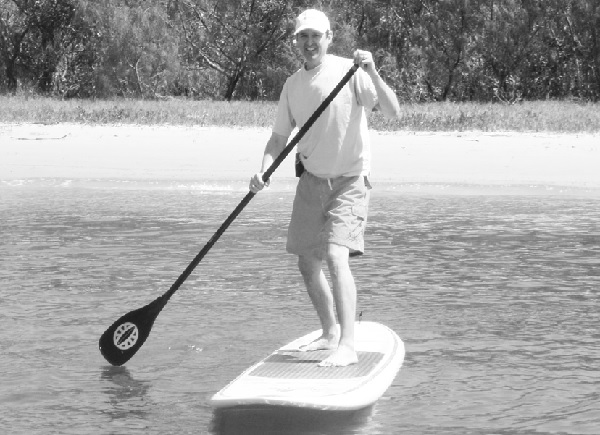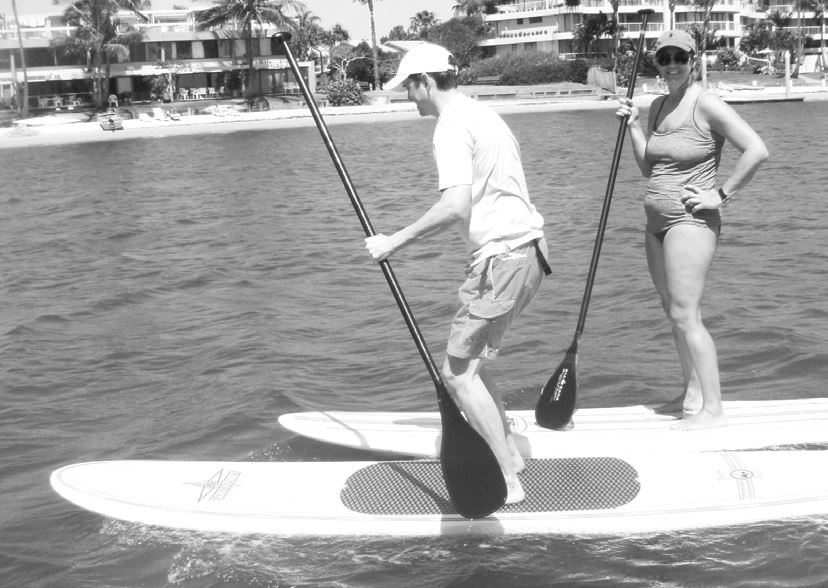Walking on Water
By Eric Vogen

There’s a hot new sport in Australia called paddle-boarding. What I like about it is that it makes me feel like I’m really trying to follow Jesus … by walking on water! As you can see in the first picture, I’m looking very confident in the calm two feet of water. Probably, this was like Peter’s initial step when Jesus asked him to walk out on to the water with him.

It was not until Peter focused on the rough water, instead of Jesus, did he start to sink. As you can see from the second picture … just the slightest wave in deeper water is throwing me off. And look where my eyes are focused compared to my calm friend next to me.

While paddle-boarding, my mind drifted to how this experience related to investing. I jotted down a few questions to ponder …
1. Why was the Aussie woman paddle-boarder completely calm while I was a nervous wreck?
2. What is the worst that was going to happen to me if I fell in?
3. Why do I think I can surf, if I can’t even paddle-board?
My paddle-boarding questions also seemed to apply to investing …
1. Why are some investors completely calm in the midst of challenges, while others are falling apart?
2. What is the worst thing that would happen if investment values fall?
3. If we can’t handle fluctuations in moderate risk investments, why do we think we can handle investing into a highly speculative area where everyone seemingly is making easy profits? (the latest bubble du jour)
Whether it is questions about paddle boarding, or investing, or Peter jumping out of a boat … What do these questions have in common? … FEAR
So, how can we walk on water instead of being thrown by the slightest wave?
WATCH OUT FOR FEAR BLIND-SPOTS
A fear blind-spot is a situation where a decision is being led by fear without even knowing it. There really wasn’t much for me to fear while I was doing the paddle-boarding. But maybe my fear blind-spot was that I didn’t want to fall in the water, since it was cold. One difference between me and the confident paddle-boarder was that she recognized fear and jumped in the cold water right at the beginning, just so that she wouldn’t worry about falling in.
Blind-spots can keep us from making good decisions and they are very difficult to see alone. For instance, during the financial crisis, we helped many people reveal fear to better focus on the facts and their circumstances. This helped people make good choices and in some cases, move on to excellent opportunities.
Some people have been asking me, “Can another financial crisis happen again”, or “Did the global coordinated reflationary response simply defer the crisis to much worse later?”
When people ask these questions, I wonder … What is the blind-spot in their questions? … What have they learned from the past? … What does the person want to do differently next time? …
I believe that we are in a global technology and communication renaissance, and during this time, bubbles and crises are logical by-products. Keys are to learn from the past, develop a strategy, and work with an advisor team to help you with blind-spots. A Bible study to help with this is by Crown Financial Ministries (www.crown.org.) My wife, Mary, and I recently completed this class in the USA and taught a class in Australia, and we found this Bible study to be very powerful in revealing blind-spots.
ACCEPT FEAR GIFTS
I’ve always wondered what the scripture means, “The fear of the Lord is the beginning of Wisdom”. Each year that passes, I think I understand this a little more. I am impressed with the idea that fear is at the beginning. Fearing what God thinks over what man thinks … fearing what God may do with me and my soul … fearing about missing the boat on what God is working on. Maybe this type of fear is a gift … to get our perspective straight about fear. Focusing on the fear of the Lord seems to make all other fears shrink by comparison.
Other fear gifts may be in the form of learning from the past, or may from your intuition or your spouse’ intuition, or may be promptings from the Holy Spirit.
It is a gift to learn from past fears. In the book, The Black Swan, the author points out that we should not just write off Black Swan events (rare, unpredictable, society-changing events) as being statistical outliers; but instead we should recognize them, embrace them, and prepare for the unimaginable.
It is a gift to listen to your intuition. Recently, I noticed a couple in a parking lot doing some unusual actions. The guy was behind their car, motioning for his girlfriend to pull out a parking spot. But it was clearly very easy to pull out. I said hello and asked if he needed help. But he didn’t answer me. I thought, maybe he didn’t hear me and I went on my way. But I had a hunch that he was using his time to scope out other cars around them to steal. There wasn’t much logic to this, just intuition. The great book, The Gift of Fear, by Gavin De Becker, goes into detail about how you can use intuition and fear to be your friend for survival. I reported details about this couple and their car to the police. And later the police caught them stealing to buy drugs.
I recently met with a married couple who made an extremely large gain on a speculative stock, which went out of business after they sold the stock. I asked them how they did this. They said that one of them had a clear thought in the night that it was time to take their gains, not get greedy, and that they could do some good things with the profits. They said it was hard to sell, because the stock was going up and because they didn’t get any administrative help selling this lightly traded non-listed stock. But the key was that they listened to each other and came up with a unified strategy. They immediately took action and somehow they made it out before the company became worthless.
Many people confuse the fear associated with wanting to sell when things are going down, with the gift of fear. My prayer is that you will be able to discern between these two types of fears.
FIND A FEAR ANTIDOTE
Some say that you should face your fears. Such as, if you are afraid of heights, go skydiving. I tried something similar recently with a friend who wanted to show me the cliff he jumps off into the ocean near the Double Island Point Lighthouse in Australia. We had a good challenging climb up the mountain and down the rocky path, through a few caves, to the launching spot. He noticed I was getting a little nervous, so he said, “I’m sorry, I forgot to ask, are you afraid of heights?” … I said, “I didn’t think I was afraid of heights … until I saw the edge of the cliff!!” There 70 feet below was the raging ocean. I thought he was crazy. But he had grown up doing these types of things and he knew this particular spot very well. Experience, faith, and skill were his fear antidotes. He didn’t jump that day, because I asked him to help me back on the track. I found it much more difficult to go back with the thought in my mind about that cliff edge. This is probably what Peter did too; he started thinking about the raging waters, more than focusing on Jesus.
I have found that the equivalent strategy of “facing your fears”, in the financial world, is by taking the antidote to fear: make a charitable gift which is deeply personal to you, which you feel moved to do by the Holy Spirit, and which may be deeply impactful for someone in great need. There are many things that I have seen this do in people’s hearts and minds. For instance, giving takes your mind off the fear of you falling off the cliff and puts it on something positive. Giving encourages your faith that God will provide what you truly need. It also empowers you to feel that if you can afford to make these charitable gifts, you don’t have to fear loss! Giving has supernatural spiritual benefits for you and the recipient, far more than we can imagine. Almost like walking on water.
Summary steps …. How to Walk on Water
A. Seek out your fear blind-spots and have advisors help you through them.
B. Take action on fear gifts.
C. Make charitable gifts as fear antidotes.
Advisory services offered through Vision Capital & Management Corporation. Securities offered through FSC Securities Corporation. A Registered Broker/Dealer. Member FINRA/SIPC. The views expressed are not necessarily the opinion of FSC Securities Corporation, and should not be construed directly or indirectly, as an offer to buy and sell securities mentioned herein. Investing is subject to risks including loss of principal invested. No strategy can assure a profit nor protect against loss. With any investment vehicle, past performance is not a guarantee of future results. There is no guarantee that a diversified portfolio will outperform a non-diversified portfolio in any given market environment. 108 S. Main Street, Suite E, Davidson, North Carolina 28036. Phone (704-894-9639) Fax (704-894-9639) Vision Capital & Management is independent of FSC Securities Corporation.


 Eric Vogen has over 23 years of investment industry experience and shares a unique financial mentoring process which encourages his clients to live in PEACE through being Philanthropic, Entrepreneurial, Abundant in their thinking about money, Committed to their callings and Enthusiastic about their lives.
Eric Vogen has over 23 years of investment industry experience and shares a unique financial mentoring process which encourages his clients to live in PEACE through being Philanthropic, Entrepreneurial, Abundant in their thinking about money, Committed to their callings and Enthusiastic about their lives.